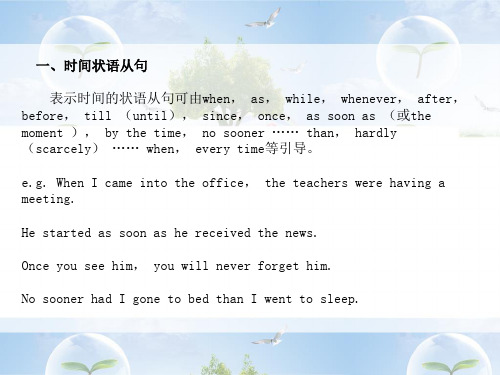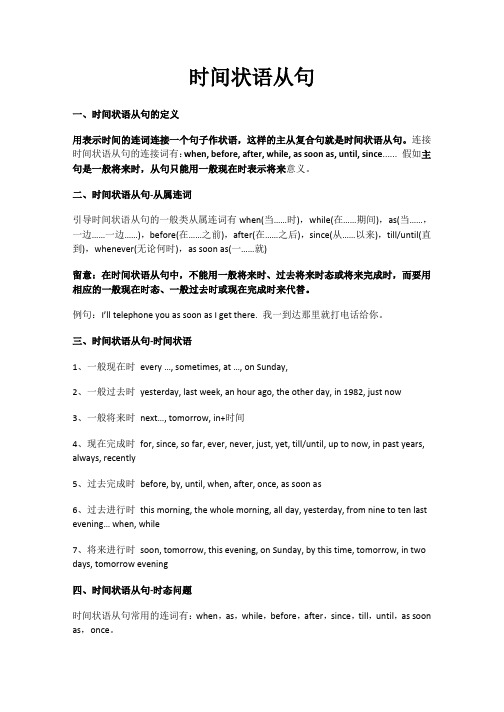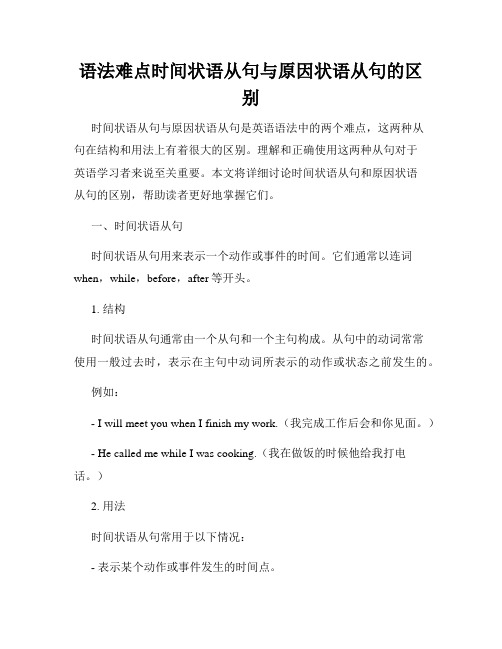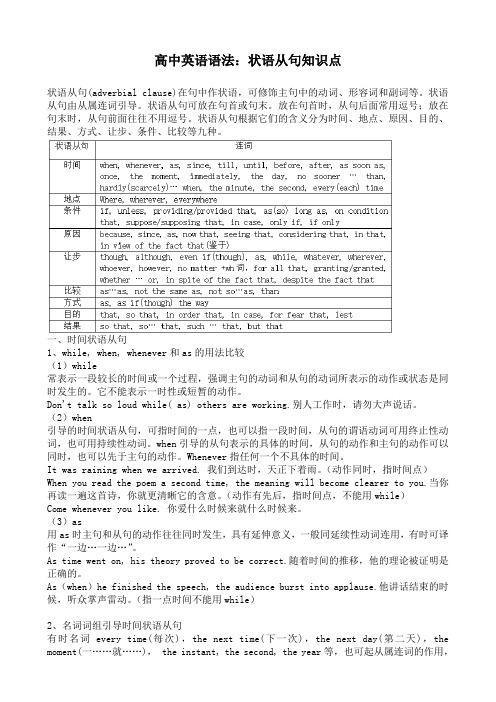英语语法辨析:时间状语从句
英语语法讲解状语从句

Whatever ( = No matter what ) you say, I'll never change my mind.
八、方式状语从句
方式状语从句常由as, as if (though), the way, rather than 等引导。
You can go swimming on condition that ( = if ) you don't go too far away from the river bank.
If he had come a few minutes earlier, he could have seen her.
e.g. He is disappointed because he didn't get the position.
As it is raining, I will not go out.
Now that you mention it, I do remember.
三、地点状语从句
引导地点状语从句的连词是where 和wherever等。 e.g. Sit wherever you like. Make a mark where you have a question.
一、时间状语从句
表示时间的状语从句可由when, as, while, whenever, after, before, till (until), since, once, as soon as (或the moment ), by the time, no sooner …… than, hardly (scarcely) …… when, every time等引导。
高中英语语法时间状语从句讲解

时间状语从句一、时间状语从句的定义用表示时间的连词连接一个句子作状语,这样的主从复合句就是时间状语从句。
连接时间状语从句的连接词有:when, before, after, while, as soon as, until, since...... 假如主句是一般将来时,从句只能用一般现在时表示将来意义。
二、时间状语从句-从属连词引导时间状语从句的一般类从属连词有when(当……时),while(在……期间),as(当……,一边……一边……),before(在……之前),after(在……之后),since(从……以来),till/until(直到),whenever(无论何时),as soon as(一……就)留意:在时间状语从句中,不能用一般将来时、过去将来时态或将来完成时,而要用相应的一般现在时态、一般过去时或现在完成时来代替。
例句:I’ll telephone you as soon as I get there. 我一到达那里就打电话给你。
三、时间状语从句-时间状语1、一般现在时every …, sometimes, at …, on Sunday,2、一般过去时yesterday, last week, an hour ago, the other day, in 1982, just now3、一般将来时next…, tomorrow, in+时间4、现在完成时for, since, so far, ever, never, just, yet, till/until, up to now, in past years, always, recently5、过去完成时before, by, until, when, after, once, as soon as6、过去进行时this morning, the whole morning, all day, yesterday, from nine to ten last evening… when, while7、将来进行时soon, tomorrow, this evening, on Sunday, by this time, tomorrow, in two days, tomorrow evening四、时间状语从句-时态问题时间状语从句常用的连词有:when,as,while,before,after,since,till,until,as soon as,once。
初中英语语法之状语从句类型及考点讲义

初中英语语法之状语从句类型及考点讲义状语从句概念解析状语从句指句子用作状语时,起副词作用的句子,可以修饰谓语、非谓语动词、定语、状语或整个句子,可分为时间、地点、原因、条件、目的、结果、让步、方式和比较等从句,是英语复合句学习的一个重点,在各类考试中都会经常出现,这次就来给大家讲解一下什么是状语从句。
1. 时间状语从句:常用引导词:when, as, while, as soon as, before, after, since , till, until特殊引导词:the minute, the moment, the second, every time, the day,the instant, immediately , directly, no sooner … than, hardly …when, scarcely … when instantlyI ran into the classroom as soon as the bell rang.2. 地点状语从句:常用引导词:where特殊引导词:wherever, anywhere, everywhereWherever the sea is , you will find seamen.3. 原因状语从句:常用引导词:because=in that, since=now that, as, for特殊引导词:seeing that, now that, in that, considering that, given thatI 'm late because I didn't caught the bus.4. 目的状语从句:常用引导词:so that, in order that特殊引导词: for fear that(唯恐/生怕),in the hope that, for the purpose that, to the end thatYou should book the hotel in advance so that the travel will be more easy.5.结果状语从句:常用引导词:so … that, such … that特殊引导词:such that, to the degree that, to the extent that, to such a degree thatHe is so young that he can't have meal by himself.6. 条件状语从句:常用引导词:if, unless,特殊引导词:as/so long as(只要), only if, providing/provided that(倘若), supposing that(倘若), in case that(以防), on condition thatYou can go to London as long as you have passport.7.让步状语从句:常用引导词:though, although, even if, even though特殊引导词: as(用在让步状语从句中必须要倒装),while,no matter …, in spite of the fact that, whatever, whoever, wherever, whenever, however, whichever, as if=as thoughThough we are old, we still can do these by ourselves.8. 比较状语从句:常用引导词:as(同级比较), than(不同程度的比较)特殊引导词:the more …the more …; just as …,so…,no … more than; not A so much as BShe is as pretty as her mother.9. 方式状语从句:常用引导词:as, as if, how特殊引导词:the wayHe didn't so it the way his brother did.辨析:while,when,as三者引导的时间状语从句时间状语从句算是状语从句中最简单的一类,也是我们日常生活交流中最常用的一类,虽然难度不大,但引导词也不少,仍然有不少同学会弄混那几个常见引导词的用法,这次就为大家带来as,when,while这几个词的辨析方法,一起看看吧。
语法难点时间状语从句与原因状语从句的区别

语法难点时间状语从句与原因状语从句的区别时间状语从句与原因状语从句是英语语法中的两个难点,这两种从句在结构和用法上有着很大的区别。
理解和正确使用这两种从句对于英语学习者来说至关重要。
本文将详细讨论时间状语从句和原因状语从句的区别,帮助读者更好地掌握它们。
一、时间状语从句时间状语从句用来表示一个动作或事件的时间。
它们通常以连词when,while,before,after等开头。
1. 结构时间状语从句通常由一个从句和一个主句构成。
从句中的动词常常使用一般过去时,表示在主句中动词所表示的动作或状态之前发生的。
例如:- I will meet you when I finish my work.(我完成工作后会和你见面。
)- He called me while I was cooking.(我在做饭的时候他给我打电话。
)2. 用法时间状语从句常用于以下情况:- 表示某个动作或事件发生的时间点。
- 表示两个同时发生的动作或事件。
- 表示一个动作或事件发生的原因。
例如:- She always wakes up early when the sun rises.(太阳升起时,她总是早早醒来。
)- We were having dinner while it started to rain.(下雨的时候我们正在吃饭。
)- He missed the bus because he woke up late.(因为他起得晚,所以错过了公交车。
)二、原因状语从句原因状语从句用来表示引起一个动作或事件的原因。
它们通常以连词because,since,as等开头。
1. 结构原因状语从句也是由一个从句和一个主句构成。
从句中的动词通常使用一般现在时,表示主句中动词所表示的动作或状态的原因。
例如:- I couldn't sleep because it was too noisy.(因为太吵了,所以我睡不着。
)- Since you are here, let's start the meeting.(既然你在这里,我们就开始开会吧。
when引导的时间状语从句和宾语从句的区别

when引导的时间状语从句和宾语从句的区别文章标题:深度剖析“When引导的时间状语从句和宾语从句的区别”在我们学习和运用英语语法时,“When引导的时间状语从句”和“宾语从句”的使用经常让人感到困惑。
它们在句子中的作用和用法有什么区别?本文将从深度和广度上对这两个语法现象进行全面评估,帮助读者更好地理解它们的区别和用法。
一、何谓“When引导的时间状语从句”和“宾语从句”1. “When引导的时间状语从句”:当“When”引导一个从句来表示时间状况时,这个从句就是时间状语从句。
例如:“I will call you when I finish my work.”(当我完成工作时,我会给你打通信方式。
)2. “宾语从句”:宾语从句是放在主句中作宾语的从句。
例如:“She said that she would come back soon.”(她说她会很快回来。
)二、区别与联系1. 意义区别:时间状语从句是用来表示主句中的动作发生的时间,而宾语从句则承担主句动词的宾语成份。
2. 结构区别:时间状语从句通常由“When”引导,宾语从句则由引导词“that”或者特定动词后的连接词引导。
3. 语义区别:时间状语从句强调主句的动作发生的时间,宾语从句则对主句动词进行了解释或补充说明。
三、深入探讨“When引导的时间状语从句”1. 语法结构:时间状语从句由“When”引导,用来表示主句动作发生的时间。
例如:“I will go to bed when I finish my homework.”(当我完成作业时,我会上床睡觉。
)2. 使用场景:常用于表示主句动作发生的时间点或条件。
例如:“I will call you when I arrive in London.”(我抵达伦敦时会给你打通信方式。
)3. 语境搭配:时间状语从句常与一般将来时态连用,以表示主句的动作将在将来某个时间点发生。
例如:“I will start cooking when you come back.”(当你回来时,我会开始做饭。
2023年中考英语语法专项之时间状语从句课件

3. 常用的时s soon as表示“一……就……”,引导时间状语从句,常和一般过去时 连用。例如:As soon as I arrived at the airport, I called my parents.
3. 常用的时间状语从句引导词
01 before 02 after 03
1. 什么是时间状语从句?
01 时间状语从句的种类 02 时间状语从句的语态 03
1. 什么是时间状语从句?
时间状语从句的种类
时间状语从句可以分为简单句和复合句两种,其中简单句只包含一个主 谓宾结构,而复合句则包含主句和从句两个部分。
1. 什么是时间状语从句?
时间状语从句的语态
时间状语从句的语态要与主句的谓语动词保持一致,即如果主句是肯定 句,则从句也要使用肯定句;如果主句是否定句,则从句也要使用否定 句。
2. 时间状语从句的语序和时态
2. 时间状语从句的语序和时态
01 语序
02 时态
03 连接词
2. 时间状语从句的语序和时态
语序
时间状语从句的语序是从句在主句之前,从句中的谓语动词要用陈述语 气。
2. 时间状语从句的语序和时态
时态
时间状语从句的时态与主句的时态有关,如果主句是一般现在时或将来 时,从句用一般现在时;如果主句是一般过去时,从句用过去时;如果 主句是过去将来时,从句用过去完成时;如果主句是现在完成时或将来 完成时,从句用完成时态。
以while引导的时间 状语从句省略
当主句的谓语动词为进行时态时,时间状语从句中的while可以省略。
4. 时间状语从句的省略
以as引导的时间状语 从句省略
当主句的谓语动词为进行时态时,时间状语从句中的as可以省略。
高中英语语法:状语从句知识点

高中英语语法:状语从句知识点状语从句(adverbial clause)在句中作状语,可修饰主句中的动词、形容词和副词等。
状语从句由从属连词引导。
状语从句可放在句首或句末。
放在句首时,从句后面常用逗号;放在句末时,从句前面往往不用逗号。
状语从句根据它们的含义分为时间、地点、原因、目的、结果、方式、让步、条件、比较等九种。
一、时间状语从句1、while, when, whenever和as的用法比较(1)while常表示一段较长的时间或一个过程,强调主句的动词和从句的动词所表示的动作或状态是同时发生的。
它不能表示一时性或短暂的动作。
Don't talk so loud while( as) others are working.别人工作时,请勿大声说话。
(2)when引导的时间状语从句,可指时间的一点,也可以指一段时间,从句的谓语动词可用终止性动词,也可用持续性动词。
when引导的从句表示的具体的时间,从句的动作和主句的动作可以同时,也可以先于主句的动作。
Whenever指任何一个不具体的时间。
It was raining when we arrived. 我们到达时,天正下着雨。
(动作同时,指时间点)When you read the poem a second time, the meaning will become clearer to you.当你再读一遍这首诗,你就更清晰它的含意。
(动作有先后,指时间点,不能用while)Come whenever you like. 你爱什么时候来就什么时候来。
(3)as用as时主句和从句的动作往往同时发生,具有延伸意义,一般同延续性动词连用,有时可译作“一边…一边…”。
As time went on, his theory proved to be correct.随着时间的推移,他的理论被证明是正确的。
As(when)he finished the speech, the audience burst into applause.他讲话结束的时候,听众掌声雷动。
Unit4语法讲义时间状语从句牛津译林版九年级英语上册

9A Unit 4语法讲义(时间状语从句)一、状语从句的概念在主从复合句中作状语的句子被称为状语从句。
三、时间状语从句1、before 引导的时间状语从句before “在...之前” 连词+时间状从(主一过从一过)e.g. He remained there for about a year before the NBA took notice of him.介词+时间点/doing e.g. before 9 a.m.2、after 引导的时间状语从句after “在...之后” 连词+时间状从(主一过从一过)e.g. The sun came out after the storm stopped.介词+时间点/doing e.g. after lunch3、when 引导的时间状语从句when “当...的时候” 连词+时间状从(主短从长、主长从短、主短从短、主将从现)长:现在/过去进行时,即谓v.是be +doing 短:一般现在/过去时,即谓v.是原形、三单、过去式e.g. The earthquake started when I was doing some cleaning the other day.e.g. Daniel was watching TV when the earthquake started.e.g. When he finally got the chance, he scored 20 points in his first game.e.g. she returns.“什么时候” 4、while 引导的时间状语从句while “当...的时候” 连词+时间状从(主短从长、主长从长)e.g. While the boys were playing football, it rained.e.g. Daniel was watching TV while his mother was washing the dishes.“而” 表对比e.g.You like sports while I like reading.注意:在[含有(when/while引导的)时间状语从句的]主从复合句中,若主句和从句的主语一致,且从句的谓v.是be动词,则可省略从句的主语和bee.g. when (he was) attending junior high, Spud tried out for the school team.( )1.A true friend can see the pain in your eyes ______ everyone else believes the smile on your face.A.whileB.becauseC.beforeD.until( )2.It is summer now in China, ______ it is winter in Australia.A.beforeB.untilC.whileD.since5、since引导的时间状语从句since“自...以来”(1)现在完成时/一般现在时+since+一般过去时主句从句( )1.[易错题]It ________ four years since my family ________ to Xiamen.A.is; have moved B.has been; has moved C.is; moved D.was; moved( )2.[变式题]How time flies! Four years ________ since I ________ to our Middle School.A.have passed; came B.has past; came C.has passed; came D.have passed; have e3. It has been a couple of years since I came to our Middle School.(改为同义句)A couple of years ________ ________ since e I came to our Middle School.(2)since+过去时间点 e.g. since then(自那时以来), since 2008, since two years ago( ). ________ no one is against this plan, let’s carry out it.A. SinceB. UntilC. AlthoughD. So6、till/until和not...till/until引导的时间状语从句till/until “直到...为止”(顺译)连词+时间状从(主一过从一过)e.g. He remained there for about a year till/until the NBA took notice of him.延续性动词=before介词+时间点 e.g. till/until today★not...till/until...“直到...才”(倒译)连词+时间状从(主一过从一过、主将从现、主情从现、主祈从现)直到(从句)才(主句)e.g. I did n’t go to bed till/until I finished my homework.短暂性动词e.g. Smokers wo n’t realize the importance of health till/until they lose it.短暂性动词e.g. For your safety, you must n’t get close to the train till/until it stops.e.g. Do n’t wake me up till/until you finish building it.( )1. [变式题]Nothing can be done _______ he returns.A.asB.untilC.whileD.before( )2. [变式题]—May I borrow another two books, Madam?—Sorry. No more books can be borrowed until these two ______.A.returnB.are returnedC.will returnD.will be returned( )3.—I’m afraid the meeting has begun. —Don’t worry. It _______ until the bell _______.A.will begin; ringsB.doesn’t begin; will ringC.won’t begin; will ringD.won’t begin; ringsNot until+一般现在时( )1. —Sir, when can we have two days off ? —Not until your task _______ tomorrow.A.pletesB.is pletedC.will be pletedD.will plete( )2. —Excuse me, when shall we play tennis at the court? —Not until it _______ next week.A.repairsB.is repairedC.will be repairedD.repair[区分] How long提问till/until,when提问Not until...( )1.—When will the rain stop? —________ next Friday. The radio says it will last for a week.A.UntilB.BeforeC.AfterD.Not until( )2.—________ will the negotiation(谈判) between the two countries last(持续)?—________ they reach an agreement(协议), I am not sure.A.How long; Not until B.When; Not until C.How long; Until D.When; Until( )3.—Mr. Li, when will the plan that solves the problem be ________?—________ all the engineers e to have a further discussion.A.turned out; Until B.taken out; Until C.broken out; Not until D.carried out; Not until [拓展]not...until...的倒装句结构和强调句结构倒装句结构:Not until+从句+主句(部分倒装语序)部分倒装:把助动词、情态动词提前强调句结构:It is/was not until+从句+that+主句(陈述语序)基本结构:We didn’t get off the bus until it stopped.倒装句结构:Not until it stopped did we get off the bus.强调句结构:It was not until it stopped that we got off the bus.( )1.[提优]Not until he left the small village __________ the world is really big.A.he did realizeB.did he realizeC.he realizedD.realized he( )2.[提优]It was not until he left the small village that __________ the world is really big.A.he did realizeB.did he realizeC.he realizedD.realized he7、as soon as引导的时间状语从句as soon as possible= as soon as sb. can/could( ). —______________ I called you, you went downstairs _______________.A.As soon as; as soon as you canB. As soon as; as soon as possibleC. Whenever; as soon asD. Since; as quickly as possibleas soon as+一般现在时( ). —When shall I hand in my report? —As soon as it _______ tomorrow.A pletes B.is pleted C.will be pleted D.will plete8、whenever引导的时间状语从句whenever “每当;无论何时” 连词+时间状从(主一现从一现、主一过从一过、主将从现、主情从现)My parents were always there for me I needed them.。
- 1、下载文档前请自行甄别文档内容的完整性,平台不提供额外的编辑、内容补充、找答案等附加服务。
- 2、"仅部分预览"的文档,不可在线预览部分如存在完整性等问题,可反馈申请退款(可完整预览的文档不适用该条件!)。
- 3、如文档侵犯您的权益,请联系客服反馈,我们会尽快为您处理(人工客服工作时间:9:00-18:30)。
英语语法辨析:时间状语从句
主要连词:when、while、as、as soon as(一......就......)、before、after、since等。
【注意1】时间状语从句要符合“主将从现”的原则:即主句用一般将来时,从句用一般现在时。
例如:
I will call you as soon as I arrive in Beijing.
我一到北京就给你打电话。
I will give you a call when I arrive at London.
我到伦敦后会给你打电话。
【注意2】since 的用法:since引导的时间状语从句必须是一般过去时,其主句必须时现在完成时。
例如:
Since I came to Beijing, I have lived here.
自从我来到北京,我一直住在这里。
【注意3】while 引导的时间状语从句中,谓语动词必须时持续的; when 引导的时间状语从句中,谓语动词可以持续也可以不持续。
例如:
While I was away last summer, my dog was taken good care of.
我去年夏天离开的那段日子里,我的狗被照顾的很好。
When I lived in that small village,I often went to play in the field.
当我住在那个小山村的时候,我经常去地里玩耍。
